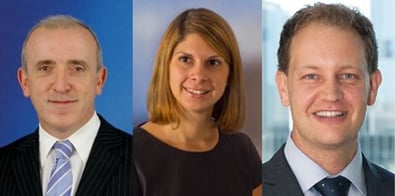 |
|
Nick Kallinikios (KPMG), Laura O'Brien (Deloitte) and Brady Dever (PwC) |
It seems like GST has barely been out of the headlines over the last 12 months.
From states and territories wanting a larger slice of the pie, to the recently implemented 'Netflix tax', what was supposed to be a fairly straightforward tax when it was introduced way back in 2000 remains complex both in practice and administration.
With so much in play, the National GST Intensive returns at just the right time.
This year’s program will be delivered over two days and will feature some of Australia’s leading GST experts from the tax profession, industry and government.
Our keynote speaker is the Hon Justice Jennifer Davies of the Federal Court of Australia who will discuss whether it is still relevant to consider the GST a “practical business tax”.
In her address, Justice Davies will look at how Sterling Guardian Pty Limited v Commissioner of Taxation has influenced recent decisions on GST and whether this approach is still relevant today, given these cases.
For the first time, given their increased prominence, the program has been expanded to look at non-GST indirect taxes in a number of breakout sessions, covering both the key legislative concepts and practical application of these taxes.
The first of these sessions looks at Fuel Tax Credits (FTC). Laura O’Brien (Deloitte) and Michael Griffith (Linfox) will provide an overview of the policy and legislation dealing with FTC entitlement and will highlight some of the issues with the interpretation of key legislative concepts.
Covering the practicalities of calculating FTC claims, Laura and Michael will also examine several case studies to highlight some of the issues that commonly arise in determining FTC entitlement.
The second choice of breakouts looks at customs and low value imported goods. Russell Wilkinson (Trusted Trader International) and Amy James-Velagic (ATO) will cover some of the topical issues affecting the taxation of goods importation, including the new overseas vendor registration model applying to the low-value threshold import rules, the Trusted Trader initiative which commenced on 1 July 2016, and private rulings covering the valuation of imported goods between 'related parties' and their interplay with transfer pricing.
In the third breakout, John Haig (John Haig Pty Ltd), Muhammad Vaseehar (Mercedes-Benz) and Andrew McIver (ATO) will look at the Luxury Car Tax and the Wine Equalisation Tax. With advisers wanting to help clients navigate some of the complexities of these indirect taxes, and an increased ATO focus on audit activities, this session will provide an update on the ‘need-to-know’ issues.
Coming out of the Board of Taxation’s recent review of GST, measures aiming to reduce the number of non-resident suppliers in cross border business-to-business arrangements who are drawn into the GST system were implemented.
On day two of the Intensive, Brady Dever (PwC) and Rebecca Smith (ATO) will present ‘B2B & B2C’, covering the impact of these changes. Looking at activities carried on in the indirect tax zone, Brady and Rebecca will look at the impact of the changes on the scope of the B2B carve-out. Discussing the role of s 9-25(5)(a) in the new environment, they will also look at anomalies including telcos, shipping, insurance, and more.
In the penultimate session, Nick Kallinikios CTA (KPMG) and George Nikolaou (Coles) will be joined by the ATO’s Jennifer Moltisanti for a session that will look at the continuing efforts to build relationships between corporates, the profession and the ATO.
You can read more about these sessions, our presenters and the rest of the program on our website. Join us on 14-15 September 2017 in Melbourne for the National GST Intensive.








